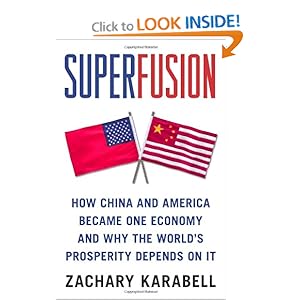April 2, 2010
Google recently announced it is moving part of its operations to Hong Kong; and harsh corruption sentences have been handed down to China-based executives of the British-Australian firm Rio Tinto. Zachary Karabell, author of Superfusion tells Renee Montagne that the recent events don't mean the business environment is souring for foreign firms in China.
TRANSCRIPT:
MARY LOUISE KELLY, host:
This is MORNING EDITION from NPR News. I'm Mary Louise Kelly.
RENEE MONTAGNE, host:
And I'm Renee Montagne. For foreign companies based in China, the last few weeks have been hard on morale. There was Google's high profile showdown with China and the company's decision to move part of its operations to Hong Kong. And this week a Chinese court handed down harsh sentences to executives of the mining giant Rio Tinto, who were convicted of bribery.
Some see this as a sign that business environment there is souring. Zachary Karabell is not one of them. He's the author of "Superfusion: How China and America Became One Economy."
Mr. ZACHARY KARABELL (Author): Look, I think Google is a fascinating story, but Google may be representative of Google. It's an unusual company. It has a moral mission that's woven into its corporate statement. Google also is immensely profitable. And Google wasn't doing so well in China. So you add all those things up and you have a company that can kind of afford to stand on principle and does so.
MONTAGNE: Do you think censorship, though, is something that companies other than Google, whose business it is, is information - do you think censorship is something other companies should be worried about in China?
Mr. KARABELL: Well, first of all, there are by some estimates at least 25 other countries in the world where Google and other companies that are in that information business globally accept levels of censorship, whether that's in large parts of the Middle East about certain type of moral content, certainly Iran. We know about North Korea. We know about - but the point is, censorship is not confined to China, nor are the issues of information companies dealing with that confined to China.
MONTAGNE: Let's turn to another event that's been in the news and had people wringing their hands about the business environment in China. And that's the sentences handed down for these Rio Tinto executives and managers. And Rio Tinto is this huge - second biggest, I think, mining corporation in the world. Is there any way not to see this as something political or at least a commentary on foreign companies being in China?
Mr. KARABELL: Look, none of us know whether or not the executives who were sentenced actually did accept bribes or engaged in some level of corporate espionage or not. It's an opaque court system. It's not like there's enough evidence out there that you and I can judge.
So a lot of the discussion then is - given that we don't know the facts here, and we never will - is this politically motivated or were these just four corrupt executives? If it was just four corrupt executives, then it signifies nothing other than four executives of a very large company immersed in the Chinese economy being caught red-handed.
Even if it's politically motivated, which it absolutely may be, that doesn't necessarily signify a cooling climate toward foreign businesses in China any more than when a U.S. spy plane went down in China and the Chinese took it apart and then sent it back in pieces after having copied the entire thing, or the Wen Ho Lee case - the physicist in Los Alamos who was accused of espionage. You know, there are crises that go on as part and parcel of a complicated relationship that do not then spell the end of this relationship.
MONTAGNE: Is it possible though that the perception that there are barriers there would make foreign companies look around for other options in Asia?
Mr. KARABELL: Well, first of all, there are barriers there, and I don't want to be construed as suggesting that there aren't. But there are barriers to entry in any foreign market. But in terms of going elsewhere, there's really nowhere else to go where you have 10 percent growth, three to six hundred million emerging middle class consumers who want stuff and have the means to actually buy stuff, and an environment that is more porous than not, where the rule of law is increasingly at least adequate to enforcement of contracts, getting your investments out if you put them in. So in many respects that's what makes Google so exceptional. It's one of the only companies that could literally afford not to do business in China.
MONTAGNE: Zachary Karabell has managed money for the China U.S. Growth Fund, and his new book is "Superfusion: How China and America Became One Economy and Why the World's Prosperity Depends On It."






No comments:
Post a Comment